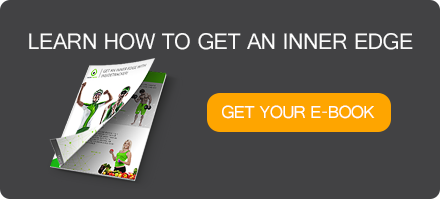![]()
Here at InsideTracker, we aim to bring you content you can use everyday: in the gym, on the race-course, on the road, at work, and at home. That's why we're excited to welcome a new guest blogger to the platform: Joe DiStefano, better known as“Joe DI”, is Director of Sport at Spartan Race, and he's a longtime friend and user of InsideTracker. Over the next few months, Joe will be sharing some of his incredible training insight on our blog. Be sure to subscribe.
In his guest blog debut, Joe DI discusses his unique and highly effective approach to recovery — specifically, sleep. Here’s what he had to say about sleeping like a pro…
In my opinion, there is no variable in recovery, mental health and wellness, that's more important than sleep. Based on what we know about stress levels in our modern world, we can assume that people have sleep problems because of chronic stress. It is critical that folks find a system that works for them, but the best advice I can give is do one thing at a time, religiously. Do not multitask. Then, continue to take steps towards the ultimate goal, which would be a really relaxing, sleep-inducing environment. The goal: fairly “Spartan” evenings with few lights, no technology, just happiness and relaxation.
My clients have success when they replace avoidable sources of subconscious sympathetic activation (the body’s fight or flight reaction under stress) with more positive, centering activities. For many, replacing TV, email, and social media at night with more relaxing, primal activities can work wonders. Meditation, music, very light yoga, family time, games, or reading all work well. But I have seen many people simply replace crime dramas with national geographic specials, as a first step, and notice improvements in their sleep. This could work as a stepping stone to the real thing.
![]()
In addition to activating the sympathetic nervous system, the bright lights emitted from TV’s, computers, and phones can disrupt the sleep cycle. Essentially, they convince the brain that the sun is out. It is no different from traveling to a new time zone where it’s light when it would otherwise be dark back home. Often times, you are not as tired as you’d otherwise be at that particular time had you been home. Light is an extremely powerful stimulus to our brains.
When it comes to improving sleep, however, there are two issues. First, many know what to do and simply do not apply that knowledge. Secondly, people who hear tips and tricks, like those I just mentioned, think they seem too farfetched or simple to be effective for them. So, they keep their lifestyle the same and just start popping a sleep aid. This is not advised.
![]()
Using an activity tracker like Fitbit provides insight as to whether your modifications are working!
As far as my personal “unplugged” method I do the following:
- Avoid email, social media, and television after 7pm. At first, many people simply avoid email or social (one, not both), and change their TV shows to more parasympathetically stimulating content.
- Have as few lights as possible on in the house. I have specific day/night lamps that I use. The day lamps have much brighter bulbs. The night lamps are much dimmer and slightly ambered. Start by turning off most of your lights after dinner.
- I make my bedroom as dark as possible. This means blackout curtains, no alarm clocks, no television, no light of any kind. To start, simply pick up and install some blackout curtains. Already have them? Be sure to keep them closed overnight.
- To ensure my parasympathetic nervous system is as active as possible, I take a few select supplements, too. These include passionflower, lemon balm, and magnesium. They are all parasympathetic stimulators and facilitate greater mental calming. (Check out Joe's list of supplements.)
- Last, I use Beddit a few nights a week to track my sleep and ensure that my interventions are working. Beddit is a strip you put on your mattress that connects to the Bluetooth in your phone. It helps quantify the improvements you are eliciting through your active pursuit of better sleep. Note: the app works on “Airplane Mode,” which helps prevent being woken by calls in the middle of the night. Secondly, always keep the phone at least 5-6 feet away from you to avoid electromagnetic stimuli.
So what does all of this mean for you aside from being on your way to your best night's sleep in ages? Well, with great sleep comes great results - blood results that is! Getting a proper night's rest can not only help you lower your cortisol and glucose levels, but also increase your total and free testosterone. Better sleep leads to better performance - it's science!
![]()
Interested in hearing more from Joe? Be sure to subscribe to our blog - he'll be back! In the meantime, you can follow him on both Facebook and Instagram.
 Get an inner edge by training based on your biomarkers. We've created this FREE e-Book to help you understand how!
Get an inner edge by training based on your biomarkers. We've created this FREE e-Book to help you understand how!
Some other blog posts we think you'll love:
- Tired of Being Tired: How I Optimized My Iron Levels
- Getting Back on Track: Laura Ingalls' InsideTracker-Fueled Journey Back to Holistic Health
- Avoiding The Crash: How Monitoring Iron Levels Can Save Your Season
- Stress Fractures: The Relationship Between Biochemistry, Nutritional Screening and Biomechanics

